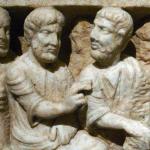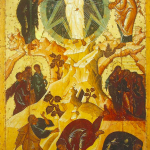
Stephen Hawking’s recent pronouncement that there is no God was unsurprising, given his past considerations of the intellectual real estate that particle physics has assumed over the past century, his thesis being that physics displaces God. More troubling is another recent piece by evolutionary biologist David P. Barash, who writes of his patronizing approach to undergraduates who cling to beliefs in creation. He gives them, he writes, “The Talk” about why biology disproves God.
And that’s where The Talk comes in. It’s irresponsible to teach biology without evolution, and yet many students worry about reconciling their beliefs with evolutionary science. Just as many Americans don’t grasp the fact that evolution is not merely a “theory,” but the underpinning of all biological science, a substantial minority of my students are troubled to discover that their beliefs conflict with the course material.
Biology, he writes, “has demolished two previously potent pillars of religious faith and undermined belief in an omnipotent and omni-benevolent God.” The first pillar is William Paley’s “watchmaker analogy” (the idea that the complexity of the universe points to a divine watchmaker), an influential thesis underpinning the “natural theology” prevalent in the 19th century. The second pillar is what he calls “the illusion of centrality”:
Moreover, no literally supernatural trait has ever been found in Homo sapiens; we are perfectly good animals, natural as can be and indistinguishable from the rest of the living world at the level of structure as well as physiological mechanism.
Those two pillars, plus the reality of suffering in the world, point to there being no God.
The more we know of evolution, the more unavoidable is the conclusion that living things, including human beings, are produced by a natural, totally amoral process, with no indication of a benevolent, controlling creator.
Most theologians I know have no problem with shaking up students’ naive beliefs; that is part of growing into mature knowledge and faith. But Barash wants to throw the baby out with the bathwater by eliminating God talk altogether. Hawking’s and Barash’s opinions point more to the limitations of intradisciplinary thinking than to anything about God. Hawking has no room for God within the confines of his disciplines of particle physics and cosmology; Barash has no room for God within the confines of his discipline of evolutionary biology. (I am reminded of the apocryphal–that is, false–story about cosmonaut Yuri Gagarin going into space and not seeing God there.)
I don’t see a strong need to defend the first pillar, and I don’t know of other theologians who do either. Complexity and evolution are part of the created order, a point which the theorist who suggested the notion of the big bang, Monsignor Georges Lemaître, took very seriously.
The second pillar is, however, of consequence. Barash’s language is curious, though: what, I wonder, does he mean by a “supernatural trait”? All human traits are natural, but from this theologian’s perspective (and those of very many others I know) they are also at the same time supernatural. Karl Rahner (drawing from the work of Martin Heidegger) held that there is a “supernatural existential,” which Mark Fischer aptly describes as “an orientation or receptivity toward God as the ground of human being.” In other words, everything natural is at the same time grounded in the supernatural. It gets to exist.
To use an analogy from the writings of Anthony DeMello, SJ, it is like the thoughtful young fish who, swimming around, asks the advice of an old wise fish. “Where is the ocean?” he asks. “You’re swimming in it,” he replied. “No, this is water. I mean THE OCEAN!” and swam away. Perhaps Barash misses God because he is looking for the supernatural.
Consider the words of the 14th century mystic Meister Eckhart:
I pray God that he may make me free of “God,” for my real being is above God if we take “God” to be the beginning of created things.
Thinking, loving, grieving, wondering, hoping, striving, hating–these are all perfectly natural, but they are also at the same time “supernatural traits.” As human beings, perhaps the most awe-inspiring of these traits is the self-transcending that unfolds in the desire to know, to understand. Theologian Michael Buckley describes God as “the direction toward which wonder progresses.” Wonder is one of those “natural supernaturals” in that it always reaches beyond the self toward greater grasp of reality. When a scientist imagines what could be the causes of things, he is exercising a supernatural existential. And as the history of science shows us, imagination–the ability to consider a reality that is not yet apprehensible with existing knowledge–is the mother of discovery.

What Hawking and Barash reject–and we should thank them for it, just as we should thank all good scientists–is a limiting view of God. See the next volume of Integritas, to be released October 20, with essays by a geneticist, a physicist, and a theologian– all of whom recognize the fruitful interplay between theological and scientific thinking.














